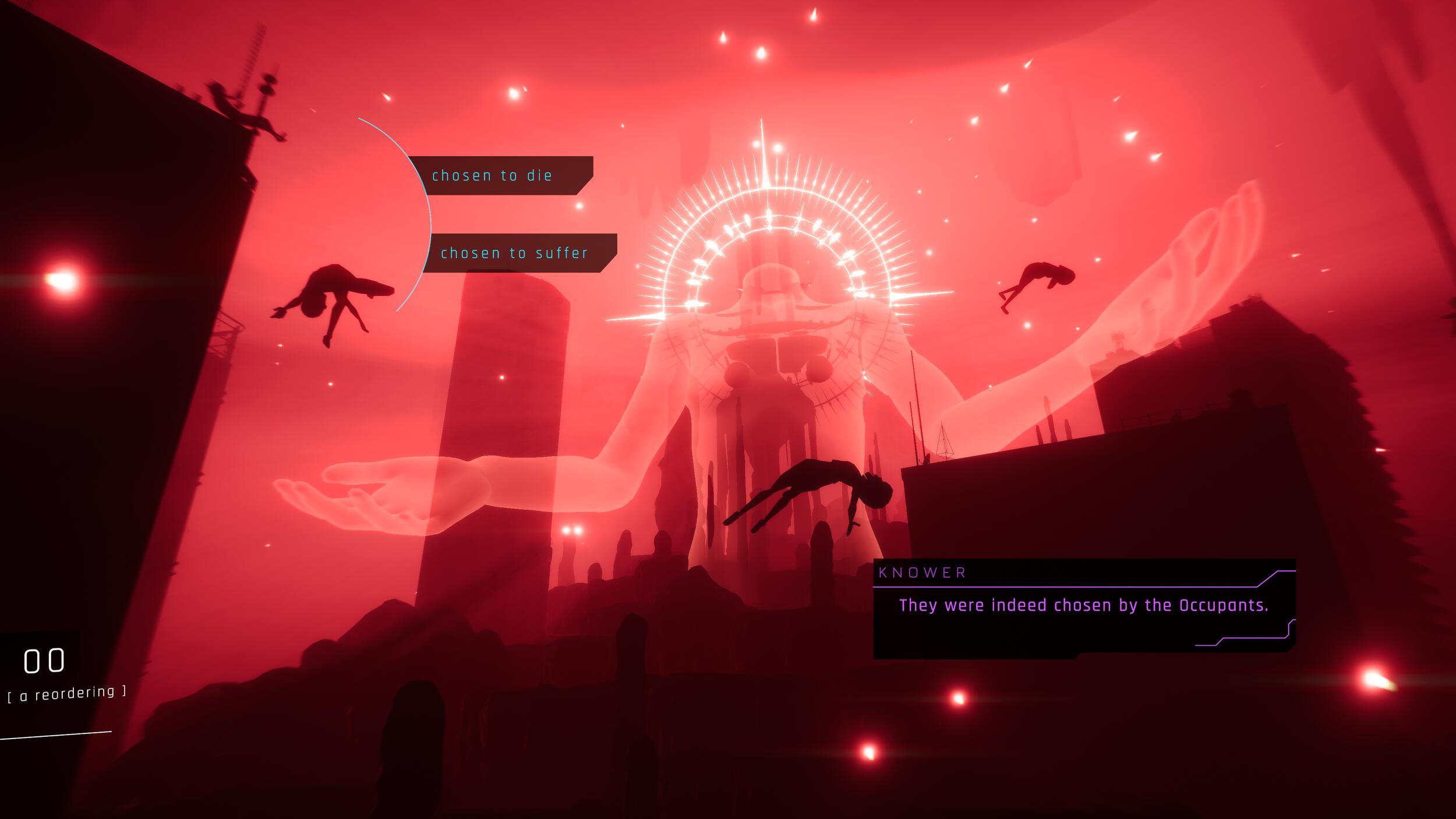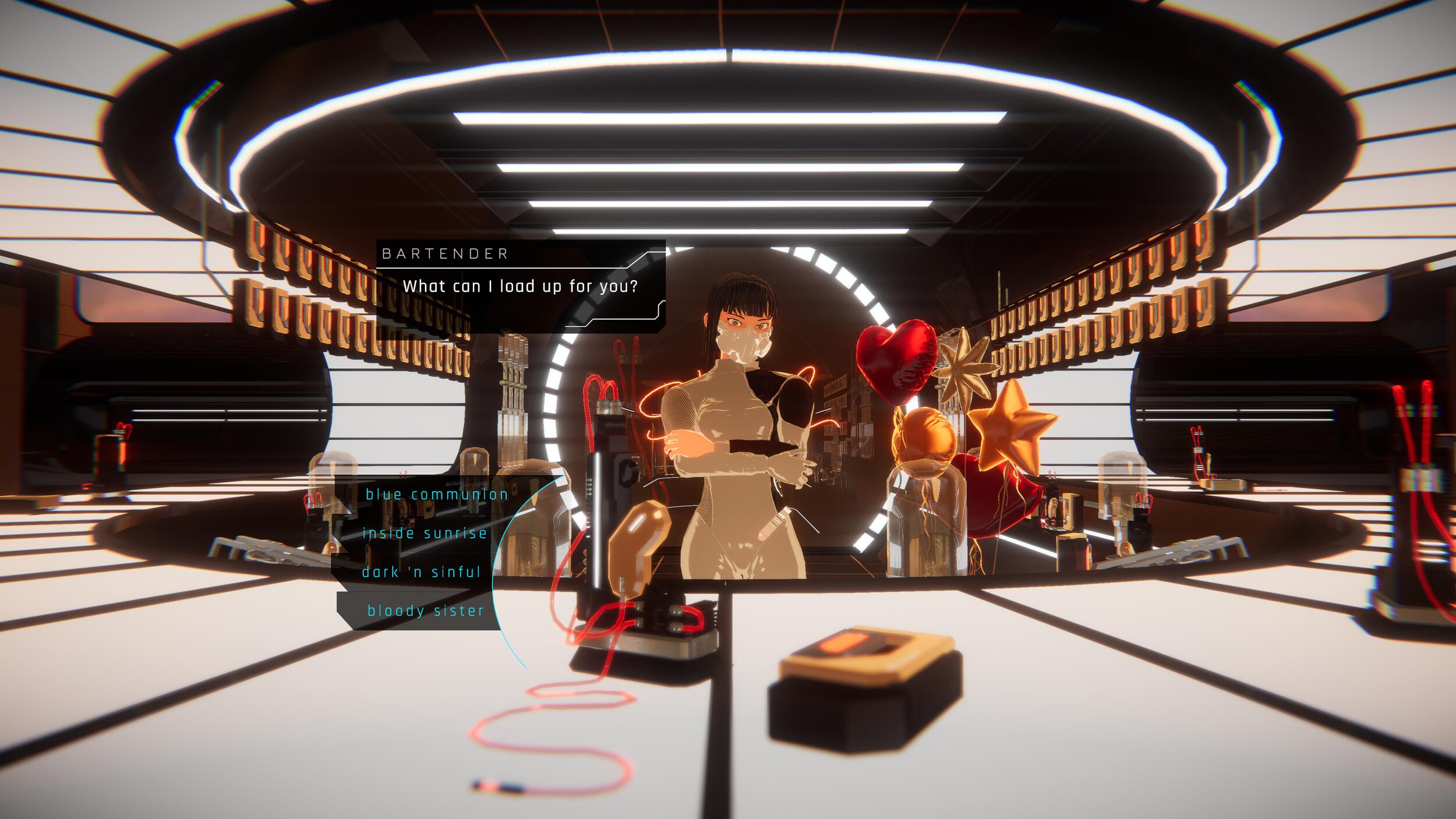
Hindsight is twenty-twenty. Which often makes the end of humanity the best time to interrogate it. Sci-fi adventure 1000xResist from developer Sunset Visitor uses its post-apocalyptic scenario to do just that. Set many years after a strange water-purging disease carried by an alien race called the Occupants has all-but annihilated our species, we explore not just how it occurred, but the nature of what it means to be human all through the eyes of one teen girl.
Those eyes, though, are kaleidoscopic – one become many. Revered as the Allmother, a whole society has sprung up literally in her image – cloned from her DNA, though without her immunity to the sickness they must live within the confines of the Orchard. Residing a distant train ride from the compound, the Sisters dream of one day being recognized enough to join her, never returning from the vast rail network.
The Allmother isn't often directly present within 1000xResist's story. But she hangs over every facet. Not just because she's the sole conduit between the old and new world, but because our viewpoint character, Watcher, will assassinate her. The bloody act provides a bombastic opening that leaves us with the question: why?
Back to the past

Turning back the clock, we follow Watcher as they say goodbye to their friend Fixer – off to ride the rails – as they continue to ponder the nature of their existence. Watcher is new to their role as an administrator, special roles within the Orchard who oversee each department, color coded to match their duties.
Neatly, they also echo facets of Allmother as a person, and facets that reside within every one of us. Bang Bang Fire heads up the military, preparing constantly for what feels like the inevitable return of the Occupants; Knower is in charge of the knowledge archive, such as surviving books; Healer doesn't just run the medical wing but the cloning department itself, carrying out vital research; and Fixer keeps everything moving as head of engineering. Above them all is Principal, ensuring everything continues to run smoothly.
As Watcher, though, you're more of an observer, able to use your special Secretary droid to enter into 'Communion', giving you direct access to literally explore the Allmother's memories from before she was thus; back when she was just an awkward teen girl named Iris. Given the opening, and an early tip-off that what we're seeing as we wander through the past may not be all it seems, we're never quite sure what we're going to uncover about Iris's relation to the Occupant threat. But we know that for Watcher, there will be an awakening.

Sensing Watcher's unease, Principal gives us new orders after our first Communion: take your sisters with you to deepen the Orchard's knowledge of the Allmother more widely. It's the perfect set-up to make sure each Communion feels fresh. Not only do you explore specific events in Iris's memory, but you also get to deepen your connection to your fellow Sisters and learn more about the world of the Orchard through their reactions to what they see.
"Placing us within both spaces as the Watcher makes its story more impactful than if it were simply written down."
Naturally, each has quite a different reaction to the events they're immersed within. Watcher might be an outside observer, but rather than staying completely neutral, she uses these perspectives to broaden her views on each event she witnesses (and yes, I'm dodging spoilers like nobody's business here – you really deserve to go in and be surprised yourself!). As clones, there's a murky line between how close all these viewpoints are to being part of our and Watcher's own feelings. Where's the line between Iris, Allmother, Watcher, and the rest of the Sisters? And where do they all really belong?
Developer Sunset Visitor is based in Vancouver, Canada, and draws on the real Asian-Canadian diaspora experience in a way that can be felt within the story, the context of the Communions neatly allowing its speculative sci-fi tale to shake hands with events much closer to home. Placing us within both spaces as the Watcher makes its story more impactful than if it were simply written down, though the writing on show in 1000xResist is definitely a major strong point. While it's not subtle about some of the parallels to real-life recent events of political resistance, allowing us to take part in exploring those threads adds a lot.
Reading mode

While 1000xResist is visual novel adjacent – there's an awful lot of (fully voice-acted) text – the way you engage with the story is quite active. Various points within Communions have you exploring, soaking up extra detail as you look at objects or listen in on snapshots of conversations, and also figuring out how to progress.
Rather than Communions being locked solely to one specific moment in time, they're connected memories from the same period. With the touch of a button you're able to jump through time, allowing you to reflect on the slow passing of days, or simply zap back and forth to move through spaces when, for instance, a door has been closed in a memory one day but is open the next (and then zapping back to see what was going on behind that lock). It's a little reminiscent of the dream-diving in AI: The Somnium Files, but with thankfully zero of the time pressure.
Even when the 1000xResist is in a more text heavy mode, you rarely feel like you're just reading reams of text thanks to the combination of voice acting and snappy writing. While the visuals can be technically rough around the edges on Switch especially (where I played), stylistically there's some breathtaking cinematography at play with how it's all put together. For those who found Necrobarista's approach easy to get into thanks to its dynamism, 1000xResist very much plays in a similar space with its presentation, using its grander narrative and wider range of situations to its advantage when finding interesting visual framing.

Tying it all together is the Orchard itself. Between Communions you have the chance to talk to sisters milling about, and check in with those you've grown closer with. It's a confusing space to navigate – even with the post-launch map that was added – that had me wishing for an almost Neon White-like fast travel menu. That is, until later chapters smartly recontextualize the spaces you've grown familiar with. It's similar to how within Communions you can toggle between different versions of the same location, but here, it's become out of your control. Time always moves on.
1000xResist is always smartly judged, and its great pacing makes it easy to work through even if you find narrative heavy games a bit intimidating. Taken a chapter at a time, its 11-12 hour runtime doesn't feel too long at all. And once it's got its hooks in you, you'll find yourself pulling much longer sessions, much in the way you often can't resist reading the next chapter in a good book. Turn the page, and begin!
1000x Resist is out now on PC and Switch. For more recommendations, head on over to our Indie Spotlight series. Or if you're just looking for the best game stories, give that a read as well!







